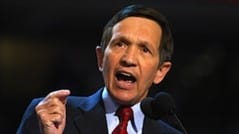
RPI Advisory Board Member Dennis Kucinich, interviewed this week on the Alan Colmes Show, emphatically argues against the United States military attacking ISIS. In particular, Kucinich explains that the US government is lying and manipulating fear to justify war on ISIS.
A big part of the US government’s trickery, Kucinich notes at the beginning of the interview, is that US “ally” Qatar is funding ISIS while the US government is bombing ISIS. Asked by Colmes what Kucinich, a two-time presidential candidate, would do regarding ISIS if Kucinich were “in power,” Kucinich responds:
Well, I’d start with having Qatar stop funding them. I mean, to me it’s not even credible that Qatar could be providing money to ISIS and the US spending $80 billion a year on so-called intelligence doesn’t know that.
Kucinich proceeds in his answer to note that Saudi Arabia was also involved in funding ISIS and that the US government funded ISIS indirectly through its funding of insurrectionists in Syria in an effort to overthrow the Syria government. Kucinich expands on this matter later, explaining:
But, if you know people who you call an ally are giving somebody who you consider a threat money, wouldn’t you pick up the phone and say “Stop”? There is no evidence in the years that [ISIS] was building that the United States made any effort to contact either Qatar or Saudi Arabia and say “Stop funding them.” As a matter of fact, I would not be surprised if the funding of these groups inside Syria was encouraged as the United States was handing out arms or making it possible for groups inside Syria to get arms without regard to identifying what their long-term ambitions were. As long as they opposed the [Syria] government, the US was for them.
Kucinich also takes on directly the widely repeated pro-war argument that the US government needs to attack ISIS to protect Christians. The sincerity of this motivation is keenly challenged by Kucinich’s observation that the “war against Christians in Syria” by ISIS and other groups that share the US government’s objective of overthrowing that country’s government “somehow escaped the US’ attention.”
Putting the beating of the war drums against ISIS into context, Kucinich discusses the effort to use fear to manipulate Americans into supporting wars since the attacks of September 11, 2001:
Everyone experiences fear in his or her life. It’s a human emotion, and we experience it…. The American people are by nature not a fearful people. And, ever since 9/11, there’s been an effort to try to instill fear in Americans so that America’s manipulated to go into wars against countries that have no ability to attack us and to continue to promote regime change around the world and to promote an American imperium, which is just absolutely contrary to the reason why this country was founded, contrary to our best interests, and contrary to a secure future — not only for America but for the world.
Kucinich warns that the fear campaign, in addition to driving a destructive foreign policy, is helping build a “national security state” that threatens Americans’ freedom.
Listen to the complete interview here:
In a September 4 article, Kucinich addressed in detail the US government’s Global War on Terror that has “created more, not less, risk to America’s long term security.” Kucinich includes in the article some bold suggestions for changing US foreign policy. You can read the article here.
